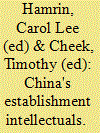| Srl | Item |
| 1 |
ID:
042615


|
|
|
|
|
| Publication |
New York, M.E. Sharpe, 1986.
|
| Description |
xix, 266p.
|
| Standard Number |
087332367X
|
|
|
|
|
|
|
|
|
|
|
|
Copies: C:1/I:0,R:0,Q:0
Circulation
| Accession# | Call# | Current Location | Status | Policy | Location |
| 028565 | 305.5240951/HAM 028565 | Main | On Shelf | General | |
|
|
|
|
| 2 |
ID:
077652


|
|
|
|
|
| Publication |
London, Zed Books, 2006.
|
| Description |
x, 172p.hbk
|
| Series |
Global History of the Present
|
| Standard Number |
9781842777220
|
|
|
|
|
|
|
|
|
|
|
|
Copies: C:1/I:0,R:0,Q:0
Circulation
| Accession# | Call# | Current Location | Status | Policy | Location |
| 052351 | 951.059/CHE 052351 | Main | On Shelf | General | |
|
|
|
|
| 3 |
ID:
158265


|
|
|
|
|
| Summary/Abstract |
The papers in this research dialogue section are the product of a project that examines intellectual life in China since the 1990s – chiefly the efforts by academic public intellectuals to rethink China’s past, present, and future in light of the excesses of Mao’s revolution, the challenges emerging from reform, and the rise of China to the status of world economic power. Chinese scholars, having benefited from China’s openness to the world and the relative relaxation of political pressure in China (until recently), have much to say about China and the world that merits our attention. Through creative collaboration between Chinese and international scholars, the articles collected here explore that intellectual public sphere since the late 1990s. The articles were written in Chinese by young PRC scholars and rendered into English through ‘collaborative translation’ teams that pair these Chinese with non-Chinese scholars based in Canadian universities. The net result, grounded on repeated conversations and revisions, is not a simple translation but a co-production of knowledge about China that aims to capture the discourse of Chinese scholarship in a way to make it meaningful to anglophone readers. The articles themselves are not traditional surveys of academic scholarship. Rather they map significant areas of an intellectual world and the arguments within it. Three widely accepted intellectual streams of thought (sichao 思潮) organize these soundings: liberals, New Left, and New Confucian. These reports explore connections between and diversity within and beyond each.
|
|
|
|
|
|
|
|
|
|
|
|
|
|
|
|
| 4 |
ID:
048659


|
|
|
|
|
| Publication |
New York, M.E. Sharpe, 1997.
|
| Description |
xiii, 407p.
|
| Standard Number |
0765600412
|
|
|
|
|
|
|
|
|
|
|
|
Copies: C:1/I:0,R:0,Q:0
Circulation
| Accession# | Call# | Current Location | Status | Policy | Location |
| 039211 | 320.5310951/CHE 039211 | Main | On Shelf | General | |
|
|
|
|
| 5 |
ID:
160505


|
|
|
| 6 |
ID:
181912


|
|
|
|
|
| Summary/Abstract |
Xi Jinping is the most powerful Chinese leader since Mao. How can one make sense of what Xi Jinping and the Chinese Communist Party are doing? This essay offers perspectives from the history of the Party and its notable style of rule: ideological governance through rectification (zhengfeng). This Party ‘statecraft’ which dates back to Yan’an in the 1940s and across the Mao period also draws on long-standing Chinese political norms. Xi Jinping is reviving a form of ideological governance in which only the Party can save China and only rectification under one supreme leader can save the Party. It is Xi Jinping’s Counter-Reformation against the reform Leninism of the past three decades and its perceived failures to manage social tensions and Party corruption.
|
|
|
|
|
|
|
|
|
|
|
|
|
|
|
|
| 7 |
ID:
072719


|
|
|
|
|
| Publication |
2006.
|
| Summary/Abstract |
This article takes recent theoretical essays by Shanghai scholar and public intellectual, Xu Jilin, and other scholars of the history of thought and culture (sixiang wenhua shi) as a case study of efforts by intellectuals in the People's Republic of China to define and promote a role as public intellectuals separate from the party-state. This analysis suggests that political liberalism is used in such intellectual discourse to explain the social experience of intellectuals in China today and to promote a renewed public role for them. This public intellectual discourse is characterized by the continued privileging of sixiang (thought), by the naturalizing of foreign theories about liberalism, and by the use of such thought work to argue for a renewed public role for intellectuals as interpreters of public issues rather than as legislators of public values.
|
|
|
|
|
|
|
|
|
|
|
|
|
|
|
|